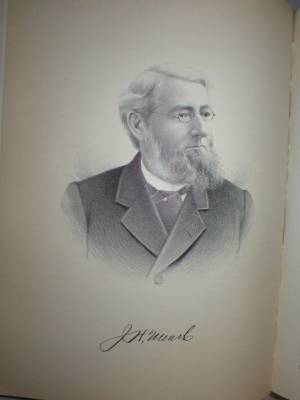|

Source: "Portrait and Biographical Record - Published 1894 by Excelsior Publishing Co., Chicago" Pages 193 - 194
James Hooker Langdon Mead, deceased. To mention this name will call to mind the noble, self-sacrificing of one of Sheboygan County's most highly-esteemed and dearly-beloved citizens. That Mr. Mead did more for the growth and prosperity of Sheboygan than any other is universally acknowledged. With perhaps one or two exceptions, not an important industry has been started in that city which does not to a greater or less extent owe its existence to his generous support.
J. H. Mead, as he was familiarly called, was born in Montpelier, Vt., December 6, 1831. His parents, Joel and Lucy {Langdon} Mead, were natives in Connecticut. Young James was left fatherless at six years of age, being reared by a widowed mother. Having completed an academic education, he began, at the age of eighteen, a career well worthy of imitation. Going to Cleveland, Ohio, he engaged as clerk in a store. His budding talents and genial disposition made him a favorite, and in short time he was admitted to partnership in the business. Later a branch store was started in Findlay, the same State, whither he went to take charge of the business. In 1854, he entered the bank at Findlay, in which he had an interest. In that city he was married, January 9, 1856, to Miss Rebecca J. Ewing, a native of that place, and a daughter of Judge John and Jane {Whitten} Ewing.
The same year {1856} Mr. Mead came to Sheboygan, and with his father-in-law and others organized the German Bank, of which he was the first Cashier. Subsequently he became President, and held that position as long as he lived. He was also President of the Crocker Chair Company; Vice-President of the Brickner Woolen Mills, of Sheboygan Falls; and Secretary of the Phoenix Chair Company, of which he was the first President. In addition to the active part he took in putting these enterprises on foot, he aided financially, as before stated, nearly every other industry of the city. Mr. Mead was a member of the first Board of Directors of the Lakeshore Railway, holding that position as long as he lived. He was a man who would take great risks in lending assistance, and was very lenient to debtors, but seldom lost thereby. it would seem that one so loaded with business could find time for nothing else; however, that was not the case. In fact, few gave more unstintingly of their time and means to good works than did he. The large congregational Sunday-school, of which he was Superintendent for many years, as well as the church, owes its material prosperity to him and a few co-laborers. He took a deep interest in young people, whose society was congenial to his cheerful disposition. Seeing the many temptations to which young men are exposed who seek entertainment on the streets or, worse still, in the saloons, he gave $10,000 in his will to the Congregational Church, to be used in providing a place for the amusement and literary culture of young men. He also bequeathed $20,000 to the city of Sheboygan for a public library.
Mr. Mead's home life was almost ideal. Whatever his burdens {and he had his share of them}, they were never brought in to mar the joys of the family circle. His healthful mirth was contagious, and his capacity for bearing the burdens was wonderful. In politics, he was pronounced Republican; in fact, his views on any question were never concealed. He had but one child, Jennie L., wife of Francis Williams, a prominent attorney of Sheboygan, and one grandchild, Janet. Mrs. mead survives, and, as was her husband, is a member of the Congregational Church. Without a moment's warning Mr. mead was taken from his family and friends, and no death in Sheboygan ever produced a more profound sorrow and regret. At about ten o'clock in the morning of September 22, 1891, in apparently good health, he was making his way from factory "A" of the Crocker Chair Company to the German Bank. He was seen to fall, but before any assistance could be rendered, he had breathed his last. It is rare that an entire city mourns the loss of one of its citizens, but such was the case at the death of Mr. Mead. Scarcely an industry failed to send a floral tribute to his funeral, as a token of their high regard for the deceased. He was esteemed, as he estimated others, for his true worth. Honest and generous in his dealings, considerate of the toiling masses, charitable to the poor, and kind to every one. Mr. Mead was a splendid example of Christian manhood.
Copyright 1997 - 2009 by Debie Blindauer
All Rights